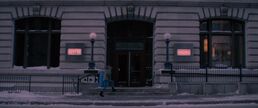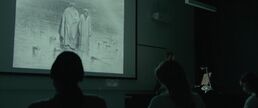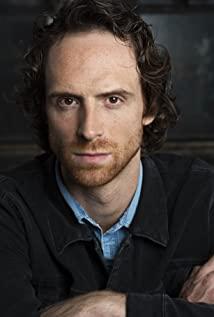In fact, this is a very strong story of psychoanalysis. If you want to do an introduction to Lacan or Althusser, rather than get caught up in the introductory texts that are either obscure or verbose or both, it's better to watch this film.
The movie itself isn't terrific, it's more about novelty (so 3 stars at most). But that in no way prevents its story from being contrasted with psychoanalysis. Even if the audience does not know the nouns used by Lacan or Althusser, it is easy to associate in that direction after watching the film - when Lacan uses the signifier of the monogamous family as the metonymy of subject becoming, Naturally, it is the intentional movement of the signifier in the accepted discourse order to evoke the audience's associations.
The family in the film is the perfect patriarchal family: a father who occupies absolute authority , a mother who is cowardly and submissive, and a child Maria who is repressed by her father. The absolute authority or dominance of the father is manifested in his right to judge Maria's state according to his general judgment of the desires of the female subject, the right to transform Maria's appearance in accordance with a fixed femininity, and in fact the right to Abandoning the deformed child Ailan; the affair shows the father's aggressiveness towards society outside the family triangle . Maria, who grew up in this atmosphere, became withdrawn and timid, swallowed up in the face of the violence of those in power relations, and could only escape sadly in the face of arrogant "friends". , social bullying and repression further expanded.
Alan appears as a mirror image that can't match Maria's actions at all, her fiery, wanton, resolute, fierce and Maria's frailty being the exact opposite. Regardless of Alan's identity (twins? Fantasy? Another personality?), all of these symbols clearly point to Maria's split . Alan can speak Maria's most secret longings, and she can bring temporary relief to Maria. This also means that Maria confirms a part of herself through the mirror image of Alan.
This structure obviously translates directly into Lacanian language:
Father - Father's name, the Other, the authoritative incarnation of the order leading to Maria's castrated "father"; Mother - Jocasta, or remnant of the original unified subject; Mirror/Aylan - Maria The embodiment of the extimité of the subject confirms the mirror image of Maria's subjectivity, which is a mirror world in which Maria is not present ; Alan's expression - "the dark desire hidden in the heart" - is Maria's split , or Maria's absent presence, those desires that cannot see the light are the reality that refuses to be symbolized, and Alan is the articulator of reality.
While family repression seems to dominate the story, and Maria's encounter at school is an indirect consequence of family trauma, sociality is in fact the dominant force behind the story . As mentioned earlier, the father’s affair reflects his aggressiveness. The father here is the personification of the patriarchy, and his aggressiveness is legal, typical, and normal; the father’s lover is what the words of the patriarchy are willing to describe. A typical "slutty female subject", she is obviously more frivolous than her mother. The father needs a submissive wife and mother to complete the reproduction in the family, and also needs a frivolous but still obedient lover to prove his aggressiveness. And the power of society - the power of ideology - is concentrated around Christmas. Her father asserted that Maria's mental problems came from "insecurity about her appearance," which was a typical representation of women in patriarchal ideology; after being comforted by Alan in the mirror, Maria became much more generous and confident than before, but she At this time, she has not been able to escape society's expectations of women: she confirmed her "female identity" in the dance with her friend and boyfriend. Confirming female identity requires being soft, vulnerable, docile, and even submissive, and this mild confirmation immediately turns into an extreme confirmation: Maria was first warned by her friend's eyes (and warned before), and then by the usual Bullies who like to bully themselves bully again. Maria's performance in line with the patriarchal ideology is also the scene where she ends up being most humiliated and emotionally broken.
Maria cried and went back to the mirror. Alan asks her to kiss the mirror, after which the two of them switch places. Although the revenge was carried out as Alan, and Maria was not present (trapped in the mirror world), it was still Maria's revenge : from the moment Maria kissed the mirror, she chose to leave the symbolic order and accept The seduction of sirens. Entering the mirror world is tantamount to acquiescing in the real world to fight back against the invasion of the symbolic order. And Alan is also the embodiment of Maria's hidden wishes. Her actions include killing enemies and directly pursuing the object of Maria's past crush. Although the "real Maria" has been trapped in the mirror world at this time, is Alan not the "real Maria"? Maria became Maria through mutual confirmation with her twin, Alan, who was Maria's desire object, Little A. At this time, Ailan/Maria has largely escaped society's expectations of women. She no longer shows submissiveness, but tramples fiercely on those who have hurt her, and her frivolity is not to cater to others. Male, but a tool for revenge. In the end, even her boyfriend who disobeyed her was directly killed by her. The plot of patricide is Oedipal (and succeeds) patriarchy, both material and symbolic. By this point, Alan/Maria has become the anti-discourse of the patriarchy, and her aggressiveness has briefly allowed her to achieve the status of the intended son of the Oedipus complex. At the end, Alan and Maria, two mirror images of each other's daughters, hug their mother, and it is the subject who succeeded in killing the father who "returned" to the same state as his mother and got rid of alienation . Alan and Maria are one here, which means she is finally no longer divided.
However, the movie is deceptive from the plot of revenge . From the moment the subject is separated from the mother, the alienated subject is doomed to be unable to return to the non-alienated state. From the inside of the family, the cowardice of the mother indicates that Maria/Alan will go further and further in the direction of alienation and division after this temporary return, and the murdered Maria/Alan cannot escape this The laws of the world - the repression of the state apparatus. The film finally completes its catharsis of repression and alienation by placing Maria/Alan in the structural position of patriarchal anti-discourse. Even Alan's expression of Maria's hidden wishes could not escape the shadow of the Other. This is where the deceit lies: although it appears that an oppressed person has accomplished his revenge, the way of revenge is already prescribed by the Other; the narrative frame in which the story is told is even the subject of patriarchy doomed to be unable to escape alienation , the fate of the split, are reluctant to tell the audience, but choose to end the story in a utopian scene that returns to the original state of unity (cosmos) and embodies the harmony of symmetry. The deceptive purpose of this narrative framing—to vent the destructive impulse at a higher symbolic level, thereby (dialectically) confining it back to control, if the audience is finally receptive to the thrill of Maria slaying her foe within the range - it is achieved.
View more about Look Away reviews











